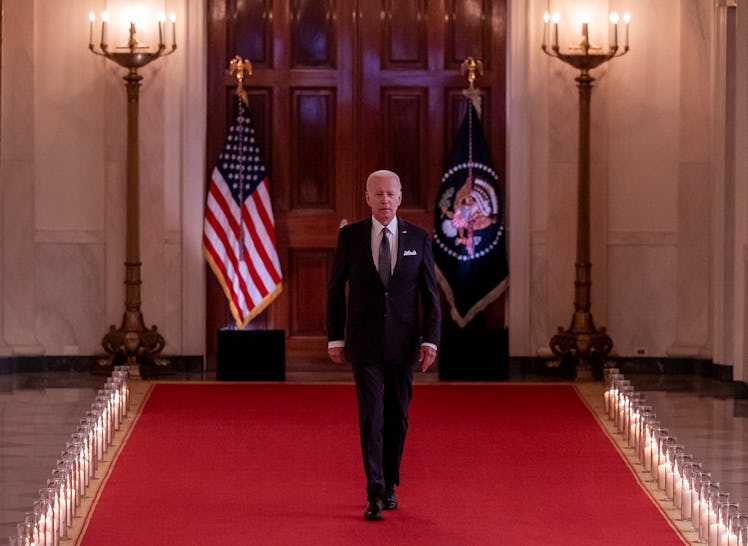Biden, Hands Largely Tied On Gun Control, Demands Congressional Action
On June 2nd, President Biden addressed America and urged Congress to take a series of actions to stop gun violence.

The United States has been home to 233 mass shootings in 2022. There have been 20 mass shootings just since last week’s massacre at a Texas elementary school that left 19 children and two adults dead. Two hundred fifty-six people have died, and 1,010 have been injured in mass shootings since the beginning of the year. Gun violence is now the number one killer of children under the age of 18. With these horrific numbers as a backdrop, President Biden made a rare evening appearance to appeal to Congress to act on gun control.
During the impassioned speech, the President pleaded with Congress to finally address the rising tide of gun violence. “After Columbine, after Sandy Hook, after Charleston, after Orlando, after Las Vegas, after Parkland, nothing has been done. This time that can’t be true,” Biden said. “This time, we must actually do something. The issue we face is one of conscience and common sense.”
What Did Biden Urge Congress to Do?
Biden urged members of Congress to reinstate the ban on assault weapons, limit high-capacity magazines, expand background checks for gun purchases, increase the legal purchase age from 18 to 21, and enact “red flag” laws that would prevent those with criminal records from purchasing weapons, allow gun manufacturers to be held liable for shootings, and provide increased mental health support for students.
But how many of those things are likely to happen?
Congressional Republicans have stonewalled any effective gun legislation for decades, claiming it infringes upon their second amendment rights. As to the Republican response to the President’s address, one aide, who spoke to the Washington Post anonymously, summed it up, “It may be helpful for Democrats, I really don’t know. But for Republicans, it’s just unserious and hurts… He needs to get out of the way and be quiet.”
There is a glimmer of hope, however, as members of the House Judiciary Committee are set to be deliberations on the “Protecting Our Kids Act,” a piece of legislation that would outlaw the importation, ownership, use, and transference of high capacity magazines, establish safe gun storage mandates, increase the purchase age of semiautomatic centerfire rifle from 18 to 21, increase penalties for trafficking and straw purchases, strengthen rules surrounding bump stocks, and apply existing federal regulations to “ghost guns.”
The Protecting Our Kids Act is expected to pass the Democratic-led House of Representatives, but Senate Republicans could, and likely will, stonewall it with a filibuster, as they do.
Does the President have to power to accomplish these changes without Congressional backing?
The short answer here is no. Due to the system of checks and balances provided by the three branches of government, any decisive action Biden takes as President to dramatically change the American gun landscape would end up being argued in front of the majority Republican Supreme Court and could be overturned.
There are a few things Biden can do, though.
He can use executive power to work with laws that already exist or change how they are enforced, such as tweaking the background check system, but creating new laws generally needs Congressional support, which, considering the slim Democratic majority in the Senate, is unlikely — unless the Democrats change filibuster rules to allow some legislation to pass.
He could also urge the Senate to confirm Steven Dettelbach, his nominee for ATF director (Bureau of Alcohol, Tobacco, Firearms, and Explosives). The agency, which regulates firearms, has been without a director permanently for the past near-seven years.
He could also appoint or bring in a czar specifically to address the gun violence epidemic. These would be positive and decisive actions. But in terms of laws he can enact through executive power, his options are limited.
“My God, the fact that the majority of the Senate Republicans don't want any of these proposals even to be debated or come up for a vote, I find unconscionable,” the President said during his address last night.